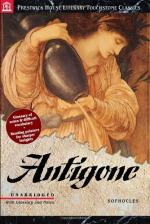|
|
Antigone Topic Tracking: Women
Women 1: Antigone wants to bury Polyneices, but her sister begs her not to go because it is in violation of Creon's decree. Antigone's younger sister Ismene believes that women should always follow whatever men want to do because women are powerless to stop them. Men rule and women are ruled.
Women 2: Creon is totally shocked that a woman such as Antigone would dare to disobey his decree. She has been arrested by a Sentry who gives Antigone over into Creon's custody. The Theban king listens to the Sentry's story with awe and disbelief. That a woman would dare to defy a man is unthinkable.
Women 3: Appearing to be very angry that a woman dared to defy his wishes, Creon boldly declares that "When I am alive no woman shall rule." The issue of Antigone being condemned to die becomes more than just a person who disobeys Creon; instead, the punishment is given even more eagerly because it is a woman who disobeys a man. Creon does not respect her because she is a woman.
Women 4: Creon believes that women must be kept in a powerless state. After they are arrested, he says that, like all women, Antigone and Ismene will "not be free to roam," thus keeping them in a state that is inferior to men. Creon has no respect for women at all.
Women 5: At first Creon urges Haemon to spit on Antigone and make her suffer for disobeying a man, and he declares that he cannot set her free because he will not be laughed at by the Theban people. He will not let people say "that a woman beat us," because this is very hurtful to his power as a man. Women have no place in Theban society except to be commanded by men, according to Creon.
Women 6: After stating so surely that a men are intended to have all over the power in Theban society and to control the women, Creon says that Haemon is a "woman's slave" because he wants Antigone to be released. This is a terrible insult to Haemon as Creon says that he is more inferior than even a woman.
Women 7: The Chorus mentions some other women in history who were forced to suffer. Danae was a mother who lived her life in exile with her son Perseus because her father wanted her son to die. Pentheus' mother was driven into madness by Bacchus and tore her son apart with her bare hands. Phineus' wife blinded her own children with a sewing shuttle. As a result, Antigone is not the only woman to suffer because of a man.
Women 8: Later, the group of Theban citizens tells of how Bacchus' own mother was struck by one of Zeus' thunderbolts and died. Again, Antigone is hardly the only woman to ever suffer because of another man. Indeed, there are many other woman who have suffered in history as well.
Women 9: Although the father Creon shows no compassion or respect for Antigone, the son loves Antigone very much since he was engaged to marry her. Haemon's devotion to Antigone causes him to first try unsuccessfully to stab his father and then to secondly stab himself, commiting suicide. He dies holding her dead body in his arms. Haemon killed himself because of a woman that he loved.
Women 10: Now, Creon is turned into very same the "woman's slave" that he had once mocked his own son for. Creon can no longer hardly walk because he is so upset about his wife's death. Just as Haemon had welcomed his own death after knowing Antigone was dead, Creon hopes to die as well, because he is so saddened by his Eurydice's death.




